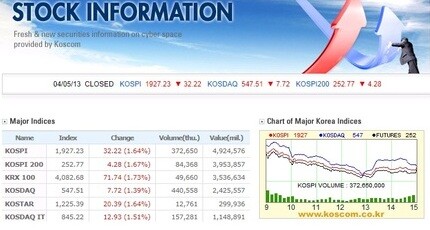hankyoreh
Links to other country sites 다른 나라 사이트 링크
Financial market hit by inter-Korean tensions

By Hong Dae-sun and Kwon Eun-joong, staff reporters
The South Korean domestic financial market is being rocked by the increasing tensions on the Korean peninsula. Apr. 5 was the second consecutive day that stock prices and the value of the won both plummeted. The South Korean government has decided that it will take steps to stabilize the market if necessary.
The KOSPI closed at 1927.23, down 32.22 (1.64%) from the previous day. This is the fifth day in a row that the index has fallen. During the past two days, foreign investors sold off more than 1.1 trillion won (US$971.82 billion) worth of stocks. In the Seoul foreign currency market, the won-dollar exchange rate closed the day up 8 won to 1131.8 won (US$1). During the two days, the value of the currency dropped more than 14 won.
The biggest factor believed to be causing the recent drop in stock prices and rise in the exchange rate is increasing uncertainty at home and abroad.
“The two negative factors of increasing geopolitical risk and aggressive quantitative easing policies by the Japanese central bank have combined to dampen interest in investing,” said Lim Jon-pil, a researcher with Hyundai Securities. “It is very likely that these will function as factors that increase volatility in the financial market for the time being,” he predicted.
In the past, the North Korean risk has usually not caused much trouble for the domestic financial market. This was because of the so-called learning effect. When the first Yeonpyeong naval skirmish took place (Jun. 15, 1999), stock prices fell 2.2% before shooting up 3.2% the following day. At the time of North Korea’s second nuclear test (May 25. 2009), stocks dropped as much as 6% during the day, but trading ended with no more than a 0.2% loss. The market was also a little jittery at the time of the death of former North Korean leader Kim Jong-il (Dec. 19, 2011), but it quickly began to recover.
As for whether the Korean financial market will again show the pattern of temporary shock, recovery, and rally as it has in the past, experts are adopting a wait-and-see attitude.
“If the market had been more robust, even negative conditions such as the North Korea risk and the weak yen wouldn’t have shaken it like this,” said Lee Jong-woo, head of the I’M Investment & Securities Research Center. “Since the economy is in such poor shape right now, even if the shock is alleviated, it does not look like it will be easy to make a quick recovery as in the past.”
The South Korean government believes it is possible that the North Korean risk will not stop having an effect on the financial markets in the short term, and it has decided to put into place market stabilizing measures based on various contingency plans.
Hyun Oh-seok, Deputy Prime Minister and Minister of Strategy and Finance, spoke on the topic during the Park administration’s first cabinet meeting on the overseas economy, held at the government building in Seoul. “Because of North Korea’s third nuclear test, the sanctions by the UN Security Council, and the backlash from the North that followed, tensions are increasing on the Korean peninsula, and risk for our economy is occurring simultaneously in multiple sectors.”
At a macro economy and financial conference held at the bank building in Myeongdong, Seoul, Choo Kyung-ho, vice Minister of Strategy and Finance, said, “Overall, the effect of North Korean threats on the financial market is limited, but it appears that this effect is increasing somewhat because of the high level of tensions. We will follow developments closely and strengthen the degree of our response.”
Neanwhile, North Korea has asked foreign embassies in Pyongyang to present plans for evacuation by Apr. 10, Russia’s Itar-Tass News Agency reported.
Please direct questions or comments to [english@hani.co.kr]

Editorial・opinion
![[Column] Has Korea, too, crossed the Rubicon on China? [Column] Has Korea, too, crossed the Rubicon on China?](https://flexible.img.hani.co.kr/flexible/normal/500/300/imgdb/original/2024/0419/9317135153409185.jpg) [Column] Has Korea, too, crossed the Rubicon on China?
[Column] Has Korea, too, crossed the Rubicon on China?![[Correspondent’s column] In Japan’s alliance with US, echoes of its past alliances with UK [Correspondent’s column] In Japan’s alliance with US, echoes of its past alliances with UK](https://flexible.img.hani.co.kr/flexible/normal/500/300/imgdb/original/2024/0419/2317135166563519.jpg) [Correspondent’s column] In Japan’s alliance with US, echoes of its past alliances with UK
[Correspondent’s column] In Japan’s alliance with US, echoes of its past alliances with UK- [Editorial] Does Yoon think the Korean public is wrong?
- [Editorial] As it bolsters its alliance with US, Japan must be accountable for past
- [Guest essay] Amending the Constitution is Yoon’s key to leaving office in public’s good graces
- [Editorial] 10 years on, lessons of Sewol tragedy must never be forgotten
- [Column] A death blow to Korea’s prosecutor politics
- [Correspondent’s column] The US and the end of Japanese pacifism
- [Guest essay] How Korea turned its trainee doctors into monsters
- [Guest essay] As someone who helped forge Seoul-Moscow ties, their status today troubles me
Most viewed articles
- 1[Column] The clock is ticking for Korea’s first lady
- 2After 2 months of delayed, denied medical care, Koreans worry worst may be yet to come
- 3[Column] Has Korea, too, crossed the Rubicon on China?
- 4[Correspondent’s column] In Japan’s alliance with US, echoes of its past alliances with UK
- 5Samsung barricades office as unionized workers strike for better conditions
- 6All eyes on Xiaomi after it pulls off EV that Apple couldn’t
- 7US overtakes China as Korea’s top export market, prompting trade sanction jitters
- 8Hong Se-hwa, voice for tolerance whose memoir of exile touched a chord, dies at 76
- 9[Photo] Smile ambassador, you’re on camera
- 10[Editorial] When the choice is kids or career, Korea will never overcome birth rate woes